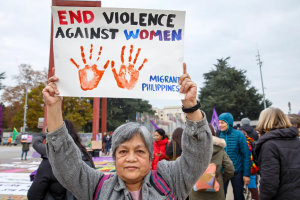By: Christina Bradic
Impunity Watch News Staff Writer
LUXEMBOURG – On January 16, 2023, the European Court of Justice (CJEU) ruled that women facing gender-based violence, including forced marriage, honor killings, and female genital mutilation, are eligible for asylum and can be granted refugee status and international protection.
 |
The Geneva Conventions and European Union Law state that a condition to obtain refugee status is persecution based on race, religion, nationality, political opinion, or membership to a specific social group. The recent CJEU decision classifies all forms of physical and mental violence as persecution and declares women, as a collective whole, a specific social group. The court found that having a ‘common concept’ will provide greater protection for women facing physical and mental violence in their communities.
The case began when a Turkish woman fled to Bulgaria after her family forced her to marry at age fifteen. She faced regular violence and death threats from her husband and immediate family members during her marriage. Subsequently, she left Bulgaria to live with a relative in Germany where she filed for international protection. Germany ruled that the violence she experienced, as well as the death threats from her husband and her family, could not be linked to reasons for persecution laid out in the law on asylum and refugees. The case then moved up to the European Court of Justice.
The court considered two pieces of international law in this case: the Convention on the Elimination of All Forms of Discrimination against Women and the Istanbul Convention and as European Union law. Both confirm a commitment to prevent and protect against gender-based violence. While ‘necessary protections’ are encouraged, this case highlighted the need for clarity around language to determine what international protections can be applied, especially when it comes to seeking asylum or refuge in a new country.
The ability to seek asylum hinges on the definition of a ‘particular social group’ and how it applies to women experiencing violence. The court started with the accepted fact that “a group is to be considered a ‘particular social group’ where two cumulative conditions are satisfied. First, the members of the relevant group must share at least one of the three following identifying features, namely an ‘innate characteristic,’ a ‘common background that cannot be changed’ or a ‘characteristic or belief that is so fundamental to identity or conscience that a person should not be forced to renounce it.’ Second, that group must have a ‘distinct identity’ in the country of origin ‘because it is perceived as being different by the surrounding society.’”
The court found that this definition can apply to women fleeing violence on the basis that:
- Women that have escaped from a forced marriage or, for married women, have left their homes, may be regarded as a ‘common background that cannot be changed’ within the meaning of that provision.
- It is clear that women may be perceived as being different by the surrounding society and recognized as having their own identity in that society, in particular because of social, moral or legal norms in their country of origin.
In cases where women do not meet the necessary conditions for refugee status, they also “may qualify for subsidiary protection status, in particular where they run a real risk of being killed or subjected to violence.”
This decision has been widely praised by international NGOs and leaders of European Union States. However, it has been noted that, in order for this ruling to have maximum benefit, women need to be aware that honor killings, forced marriages, female genital mutilation, and similar forms of violence qualify them for protection under international law.
For further information, please see:
Deutsche Welle – EU court rules gender-based violence ground for asylum– 17 Jan. 2024
Irish Legal News – CJEU: Women can claim asylum due to gender-based violence – 18 Jan. 2024